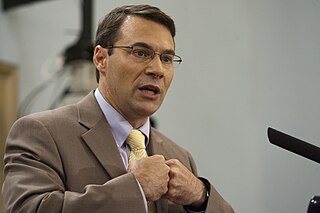Related Research Articles

Charles Chandler Krulak is a retired United States Marine Corps four-star general who served as the 31st Commandant of the Marine Corps from July 1, 1995 to June 30, 1999. He is the son of Lieutenant General Victor H. "Brute" Krulak, who served in World War II, Korea, and Vietnam. He was the 13th President of Birmingham-Southern College after his stint as a non-executive director of English association football club Aston Villa.
The United States Armed Forces are the military forces of the United States. The armed forces consist of six service branches: the Army, Marine Corps, Navy, Air Force, Space Force, and Coast Guard. All six armed services are among the eight uniformed services of the United States.

The defense readiness condition (DEFCON) is an alert state used by the United States Armed Forces. For security reasons, the US military does not announce a DEFCON level to the public.

The Goldwater–Nichols Department of Defense Reorganization Act of October 4, 1986 made the most sweeping changes to the United States Department of Defense since the department was established in the National Security Act of 1947 by reworking the command structure of the U.S. military. It increased the powers of the chairman of the Joint Chiefs of Staff and implemented some of the suggestions from the Packard Commission, commissioned by President Reagan in 1985. Among other changes, Goldwater–Nichols streamlined the military chain of command, which now runs from the president through the secretary of defense directly to combatant commanders, bypassing the service chiefs. The service chiefs were assigned to an advisory role to the president and the secretary of defense, and given the responsibility for training and equipping personnel for the unified combatant commands.

The Naval Postgraduate School (NPS) is a public graduate school operated by the United States Navy and located in Monterey, California.
Fourth-generation warfare (4GW) is conflict characterized by a blurring of the distinction between war and politics, and of the distinction between combatants and civilians.

The United States Strategic Command (USSTRATCOM) is one of the eleven unified combatant commands in the United States Department of Defense. Headquartered at Offutt Air Force Base, Nebraska, USSTRATCOM is responsible for strategic nuclear deterrence, global strike, and operating the Defense Department's Global Information Grid. It also provides a host of capabilities to support the other combatant commands, including integrated missile defense; and global command, control, communications, computers, intelligence, surveillance, and reconnaissance (C4ISR). This command exists to give "national leadership a unified resource for greater understanding of specific threats around the world and the means to respond to those threats rapidly".

Modern warfare is warfare that diverges notably from previous military concepts, methods, and technology, emphasizing how combatants must modernize to preserve their battle worthiness. As such, it is an evolving subject, seen differently in different times and places. In its narrowest sense, it is merely a synonym for contemporary warfare.
Network-centric warfare, also called network-centric operations or net-centric warfare, is a military doctrine or theory of war that aims to translate an information advantage, enabled partly by information technology, into a competitive advantage through the computer networking of dispersed forces. It was pioneered by the United States Department of Defense in the 1990s.
Lawfare is the use of legal systems and institutions to damage or delegitimize an opponent, or to deter an individual's usage of their legal rights. The term may refer to the use of legal systems and principles against an enemy, such as by damaging or delegitimizing them, wasting their time and money, or winning a public relations victory. Alternatively, it may describe a tactic used by repressive regimes to label and discourage civil society or individuals from claiming their legal rights via national or international legal systems. This is especially common in situations when individuals and civil society use nonviolent methods to highlight or oppose discrimination, corruption, lack of democracy, limiting freedom of speech, violations of human rights and violations of international humanitarian law.
William S. Lind is an American conservative author, described as being aligned with paleoconservatism. He is the author of many books and one of the first proponents of fourth-generation warfare (4GW) theory and is the Director of The American Conservative Center for Public Transportation. He used the pseudonym Thomas Hobbes in a column for The American Conservative.

Lieutenant General Gregory S. Newbold is a retired United States Marine Corps 3-star general who served as Director of Operations (J-3) for the Joint Chiefs of Staff from October 2000 until he retired in October 2002. Openly critical of Donald Rumsfeld's plans for the invasion of Iraq, he retired partly as a protest.

Psychological operations (PSYOP) are operations to convey selected information and indicators to audiences to influence their motives and objective reasoning, and ultimately the behavior of governments, organizations, groups, and large foreign powers.

Bryan Douglas "Doug" Brown is a retired four-star United States Army general. He retired in 2007 after four decades of military service. In his final assignment, he served as the seventh commander of United States Special Operations Command (USSOCOM), from September 2, 2003, until July 9, 2007. As USSOCOM's commander, he was responsible for all unified special operations forces, both active duty and reserve.
A cyber force is a military branch of a nation's armed forces that conducts military operations in cyberspace and cyberwarfare. The world's first independent cyber force was the People's Liberation Army Strategic Support Force, which was established in 2015 and also serves as China's space force. As of 2022, the world's only independent cyber forces are the PLA Strategic Support Force, the German Cyber and Information Domain Service, Norwegian Cyber Defence Force, and the Singapore Digital and Intelligence Service.

John Albert Nagl is a retired Lieutenant Colonel in the United States Army. He is a former president of the Center for a New American Security and former headmaster of The Haverford School. Nagl is an expert in counterinsurgency and has published two books on military strategy.
Hybrid warfare is a theory of military strategy, first proposed by Frank Hoffman, which employs political warfare and blends conventional warfare, irregular warfare, and cyberwarfare with other influencing methods, such as fake news, diplomacy, lawfare, regime change, and foreign electoral intervention. By combining kinetic operations with subversive efforts, the aggressor intends to avoid attribution or retribution. The concept of hybrid warfare has been criticized by a number of academics and practitioners due to its alleged vagueness, its disputed constitutive elements, and its alleged historical distortions.
The Chief of Naval Operations Strategic Studies Group (SSG) was established by Chief of Naval Operations Admiral Thomas B. Hayward in 1981. The Group was co-located at the United States Naval War College in Newport, Rhode Island, and received its direction and made its reports only to the Chief of Naval Operations. The SSG was disestablished in 2016 by the Chief of Naval Operations (CNO) Admiral John Richardson.

Gabriel "Gabi" Siboni is a colonel in the Israel Defense Forces Reserve service, and a senior research fellow and the director of the Military and Strategic Affairs and Cyber Security programs at the Institute for National Security Studies. Additionally, he serves as editor of the tri-yearly published, Military and Strategic Affairs academic journal at INSS. Siboni is a senior expert on national security, military strategy and operations, military technology, cyber warfare, and force buildup. Siboni is an Associate Professor, working specifically in the management of Cyber Security and a part-time lecturer at the Francisco de Vitoria University in Madrid
The Fletcher School's International Security Studies Program is a center for the study of international security studies and security policy development. It was established in 1971 at The Fletcher School of Law and Diplomacy, Tufts University. ISSP conducts its academic activity through courses, simulations, conferences, and research. It also has a military fellows program for midcareer U.S. officers.
References
Notes
- ↑ Stannard, Matthew (6 August 2006). "NEWS ANALYSIS / Hezbollah wages new generation of warfare". San Francisco Chronicle . Retrieved 30 April 2015.
- 1 2 Hammes, Colonel T. X., USMC, Retired. "The U.S. Army Professional Writing Collection". Army.mil. Archived from the original on 2014-05-11. Retrieved 2014-05-21.
{{cite web}}: CS1 maint: multiple names: authors list (link) - 1 2 "Forgotten Warriors". Kansaspress.ku.edu. Archived from the original on 2014-05-21. Retrieved 2014-05-21.
- ↑ Institute for National Strategic Studies (INSS). "T.X. Hammes, PhD | Institute for National Strategic Studies (INSS)". Inss.dodlive.mil. Retrieved 2014-05-21.
- ↑ Parameters book review
- ↑ Hammes, Thomas X. The Sling and The Stone: On Warfare in the 21st Century. Zenith Press. 2004. ISBN 0-7603-2059-4.
- ↑ Branigin, William (September 25, 2006). "Three Retired Officers Demand Rusmfeld Resignation". The Washington Post .
- ↑ transcript from Lou Dobbs Tonight CNN (November 1, 2006)
- ↑ "'The Sling and the Stone': Next-Generation War" NPR (November 18, 2004)
- ↑ "Interviews: Marine Col. Thomas X. Hammes" "Private Warriors" Frontline PBS (June 21, 2005)
- ↑ Hammes, Thomas (2010), "Assumptions – A Fatal Oversight", Infinity Journal, vol. 1, no. 1, pp. 4–6
- ↑ Hammes, Thomas (2011), "Limited means strategy: What to do when the cupboard is bare", Infinity Journal, vol. 1, no. 3, pp. 8–10